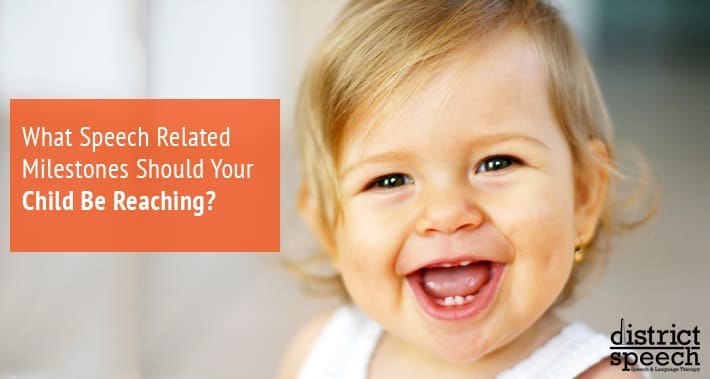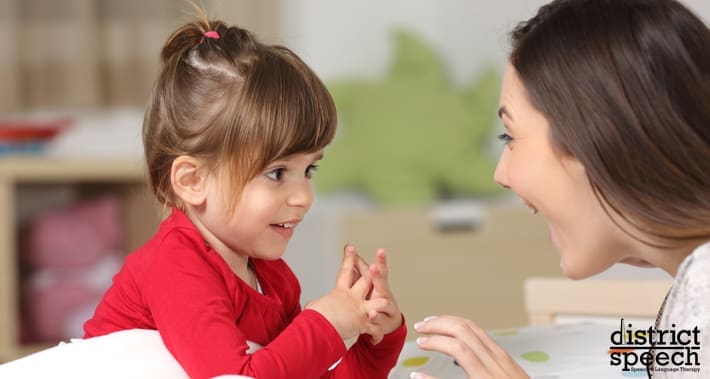
There’s no doubt that children’s milestones are anticipated and treasured moments for every parent.
However, milestones also highlight important behavioral or physical checkpoints in your child’s development.
Therefore, it’s crucial that you closely monitor these milestones to make sure everything is going well.
Paying attention to speech related milestones is particularly helpful for identifying developmental issues in their early stages.
For instance, hearing impairments are commonly diagnosed in children experiencing delayed speech developmental milestones.
Every child develops at their own pace.
So it’s sometimes difficult to determine whether your child requires speech therapy intervention.
Would you like to find out more about childhood speech related milestones?
Or perhaps you’ve already noticed some concerning speech patterns, such as stuttering, or delays in your child.
RELATED: What Is Stuttering And How Can A Speech Therapist Help?
We’re District Speech and Language Therapy, a Washington DC speech therapy clinic who offers pediatric speech therapy.
If your child is showing signs they’re falling behind with their developmental milestones, we can help.
RELATED: Speech Therapy For Late Language Emergence
For now, let’s find out more.
What Are Speech Development Milestones?
As mentioned previously, milestones in general are important checkpoints in childhood development.
According to the National Institute On Deafness and Other Communication Disorders, these milestones help healthcare professionals determine whether your child might require early intervention.
These functional skills are age specific tasks that most children achieve around a certain age.
Speech development milestones typically start when children start recognizing, understanding, and even imitating the basic sounds, such as language, of their environment.
Is Your Child Meeting Their Speech Development Milestones?
Some children don’t reach expected speech milestones that are typical for their age range.
In fact, there are many common speech disorders in the United States that can impact speech development.
However, keep in mind that every child is different and learns at their own pace.
Reasonable delays are perfectly normal and not necessarily a major cause for concern.
If your child is still making progress but reaches their milestones a week or two slower than their peers, you probably don’t need to worry.
However, if you notice atypical symptoms or behaviors accompanied by speech delays, you might consider bringing your child into District Speech for an assessment.
There are a few different reasons for this.
First of all, early intervention speech therapy has been shown to be more effective than waiting until later.
Additionally, some children with speech or language skill delays may also experience some degree of hearing impairment.
According to Boston Children’s Hospital, childhood hearing loss is linked with sound production, as well as with speech and communication skills.
It’s important to address this issue sooner rather than later in order to avoid further developmental issues and delays.
Left untreated, communication deficits in adults can lead to a variety of lifelong complications, such as:
- Shame and embarrassment
- Depression and anxiety
- Poor academic performance
- Diminished employment opportunities
- Low self esteem
- Social isolation
- Reading and writing difficulties
So, what can you do to prevent such complications?
You can monitor your child’s developmental milestone progress and discuss any concerns you may have with a qualified speech therapist.
The following guidelines can help you determine whether your child is meeting their speech milestones.
By 3 Months Old
By the time your child is three months old, they ought to:
- Smile when they see you
- Become quiet or smile when spoken to
- Recognize your voice
- Make cooing sounds
- Vocalize their emotions by crying, laughing, or fussing
- Cry to express their needs
- React to excessive noise
- Stops feeding when spoken to
By 6 Months Old
By the time your child is six months old, they ought to:
- Start baby babbling
- Make gurgling sounds when playing or left alone
- Make sounds to express what they like and don’t like
- Track sounds with their eyes
- Respond to changes in your tone of voice
- Pay attention to music
- Understand the meaning of “no-no”
- Say “ba-ba-ba”, “ma-ma”, or “da-da” without meaning
- Try to communicate using gestures
- Try to imitate sounds
- Say their first word
- React to music
- Respond to toys that produce sound
- Laugh
By 12 Months Old
By the time your child is 12 months old, they ought to:
- Try imitating speech
- Say a few words like “dada” and “mama”
- Answer simple questions nonverbally
- Try to imitate simple words
- Understand when they are called
- Recognize words for common items
- Have a vocabulary of 4 to 6 words
- Orientate their body to the direction of sound
- Babble for attention
- Use nonverbal communication, such as waving
By 18 Months Old
By the time your child is 18 months old, they ought to:
- Follow simple directions
- Know the name of common foods, such as fruits and vegetables
- Recognize names of family members, objects, and body parts
- Imitate animal sounds
- Start to combine words
- Use two word phrases
- Say about 10 words
- Have a vocabulary of 50 words, even if the pronunciation is unclear
- Respond to short stories and nursery rhymes
- Identify objects in story books, when named
By 2 Years Old
By the time your child is 2 years old, they ought to:
- Use simple phrases
- Follow simple commands
- Understand simple questions
- Know descriptive words
- Use three word sentences
- Begin to use plurals and regular past tense verbs
- Speak about 50 or more words
- Know spatial concepts, such as “in” or “on”
- Know pronouns, such as “you” or “me”
- Pronounce words beginning with “k”, “g”, “f”, “t”, “d”, and “n”

What To Do If Your Child Isn’t Meeting Their Milestones
Parents may wonder when their child should go see a speech therapist.
If you notice delays in your child’s speech and language development, based on the guidelines above, it’s a good idea to make an appointment with a speech therapist.
However, always remember that each child learns at their own pace and according to their environment.
It’s important to keep communicating with your child and encourage imitation, unless they have undiagnosed hearing loss or a developmental disorder.
If this is the case, a speech therapist can help identify the problem.
But many parents can usually tell the early signs of speech and language disorders in their child, based on unique behavioral patterns and symptoms.
They can also help mitigate such issues by using a variety of strategies.
Below are some easy methods to interact with your child so that you can help strengthen their speech skills:
- Let your child know that you are happy when they speak, such as by smiling or responding enthusiastically
- Teach them animal sounds, such as “woof” and “meow”
- Teach them how to count
- Imitate your child’s sounds
- Try to always speak clearly to them, but some baby talk is fine from time to time
Book Your Appointment With District Speech Today
If you suspect your child might have some developmental delays based on the guidelines presented in this article, you might consider working with a speech therapist.
If you’re not sure about making this decision yet, follow the recommendations mentioned previously and keep track of your child’s speech related milestones.
Remember that professional help is always available for you and your child, and that District Speech can provide you with experienced pediatric speech therapists at any time.
Book your appointment with District Speech today to schedule a speech assessment.
1300 I St NW, Suite 400 E,
Washington, DC 20005
- https://g.page/districtspeech
District Speech and Language Therapy specializes in speech therapy, physical therapy, and occupational therapy solutions, for both children and adults, in the Washington D.C and the Arlington Virginia areas.